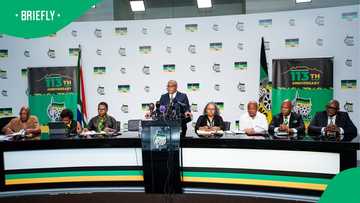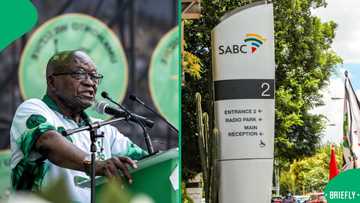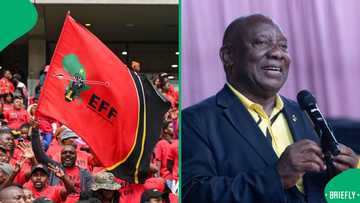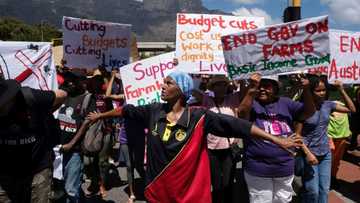Structure and functions of the South African government: All the details
Cyril Ramaphosa is the incumbent president of South Africa since 2018. He is the head of the country's government. The country has a constitution that lays out the structure and functions of the South African government.

Source: Getty Images
TABLE OF CONTENTS
- Structure and functions of the South African government
- What are the three levels of government in South Africa?
- What is the role of the national government in South Africa?
- What type of government is South Africa?
- What is the main function of the local government in South Africa?
- What is the government system of South Africa?
- What is the structure and function of the South African government?
- What is the function of the national government in SA?
There are three levels of the national government in South Africa, each with distinct functions. The country also has provincial and local governments to ensure all services reach the grassroots levels. All the levels work together to ensure the country is running smoothly. Discover more about the structure and functions of the South African government today.
Structure and functions of the South African government
The South African government structure has three arms, as listed below.
- National Legislature
- Executive authority
- Judicial authority
Below is an exploration of the three levels of government in South Africa and their roles.
1. The National Legislature (Parliament)
The National Legislature or Parliament is often mentioned first when the three levels of government and their functions are mentioned. Parliament is composed of the following.

Read also
ANC Lekgotla resolves to tackle service delivery issues and rebuild railways, SA remains doubtful
- The National Assembly (NA)
- The National Council of Provinces (NCOP)
Did you know parliamentary sittings in SA are open to the public? Parliament is the legislative authority of the country. It has the power to make laws for the country.
Functions of Parliament
The functions of Parliament are listed below.
- Law-making: Section 43(a) of the Constitution gives the National Assembly the power to consider, pass, amend or reject any legislation. Members can initiate any legislation with the exception of Money Bills.
- Oversight function: The South African Parliament is a cornerstone of democracy. It oversees the Executive and holds it to account to ensure it implements the country's laws.
- Public participation: South Africa is a democracy, and Parliament ensures participatory democracy to strengthen institutions. This is why parliamentary sittings are open to the public.
- International participation: Members of Parliament are responsible for the continuation of the political process and dialogue among legislatures of the world. They exchange views with members of Parliament from other countries.
- Cooperative governance: Parliament facilitates cooperative governance. It does this through facilitating work cooperation with the other arms of government.

Source: Getty Images
2. Executive Authority
The executive arm of government comprises the president, cabinet, and deputy ministers. The president holds the power to appoint and assign duties to the deputy president, ministers, and deputy ministers.
The South African president is the executive manager of the government. S/he can choose any number of ministers from the members of the National Assembly. S/he can choose not more than two ministers from outside the National Assembly.
Functions of the Executive Authority
The Executive Authority is responsible for the roles listed below.
- It is responsible for the daily administration of the country
- It develops and implements national policy
- It coordinates the functions of the government
- The executive has the power to propose changes to existing legislation and initiate new policies
3. The judicial system
The South African judicial system is the third arm of government. It is made up of the courts and judges that promote justice in the country.
The Chief Justice is the head of the judiciary in SA, and the judicial authority of the Republic is vested in the courts.
The courts are independent and only follow the Constitution and the law. They must apply impartially and act without fear, favour, or prejudice or any grounds. The types of courts in the country are listed below in descending order.
- The Constitutional Court
- The Supreme Court of Appeal
- The High Court of South Africa
- The Magistrates' Courts
- Any other court established in terms of an Act of Parliament

Source: UGC
Functions of the judiciary
The functions of the judiciary are regulated by the Judicial Service Commission, which consists of the Chief Justice, the President of the Supreme Court of Appeal, and the cabinet member responsible for the administration of justice, among other members.
- The judiciary interprets, protects, and enforces the law
- It decides disputes and applies the Constitution in the name of the state
- It is tasked with ensuring equal justice under the law
NB: To ensure a properly functioning government, the country has provincial and local governments. These ensure government services trickle down to the ordinary citizen.
What are the three levels of government in South Africa?
The three levels are National Legislature (Parliament), Executive, and Judiciary.
What is the role of the national government in South Africa?
The primary role of the national government in South Africa is to make laws and set policies for the country. It also provides services which fall under national competencies.
What type of government is South Africa?
South Africa is a democracy. This means that power is vested in the South African people, who are responsible for electing their political leaders. The Constitution limits a presidential term to five years, and the maximum a president can sit in office is two terms (10 years).
What is the main function of the local government in South Africa?
The main role of local authorities is to give residents at the grassroots level a say in the government and administration of local affairs.
What is the government system of South Africa?
The government system in SA is a democracy that gives power to the people. The government has three levels, i.e., the Legislature, Executive, and Judiciary.
What is the structure and function of the South African government?
The SA government has three arms, i.e., the National Legislature (Parliament), the Executive, and the Judiciary. Each has distinct functions, as explored earlier in the article. The three arms work together to ensure the country is running smoothly.
What is the function of the national government in SA?
The national government in SA makes laws and sets policies for the country. It is responsible for providing all the services that fall under national competencies to citizens.
It is essential for citizens and residents of SA to understand the structure and functions of the South African government. The three levels of government are the National Assembly, the Executive, and the Judiciary.
Briefly.co.za recently published a list of the main causes of unemployment in South Africa. There are many reasons for unemployment in present-day SA.
The main concerns that cause the lack of job opportunities are recession on a global scale, sky-high interest rates, and an overall financial crisis.
Source: Briefly News

Cyprine Apindi (Lifestyle writer) Cyprine Apindi is a content creator and educator with over six years of experience. She holds a Diploma in Mass Communication and a Bachelor’s degree in Nutrition and Dietetics from Kenyatta University. Cyprine joined Briefly.co.za in mid-2021, covering multiple topics, including finance, entertainment, sports, and lifestyle. In 2023, she finished the AFP course on Digital Investigation Techniques. She received the 2023 Writer of the Year Award. In 2024, she completed the Google News Initiative course. Email: cyprineapindi@gmail.com

Justine De Lange (Lifestyle writer) Justine De Lange has over 6 years of experience in lifestyle, corporate and freelance writing. She started at Now Media for their lifestyle publication 'Let's Go', then joined 'travSIM' and 'Metavaro'. She now writes for Briefly News as a content writer, working with beats such as studies, services, business tips, and celebrity biographies (joined in 2022). In 2023, Justine finished the AFP course on Digital Investigation Techniques. You can contact her directly via JustinedeLange14@gmail.com.





